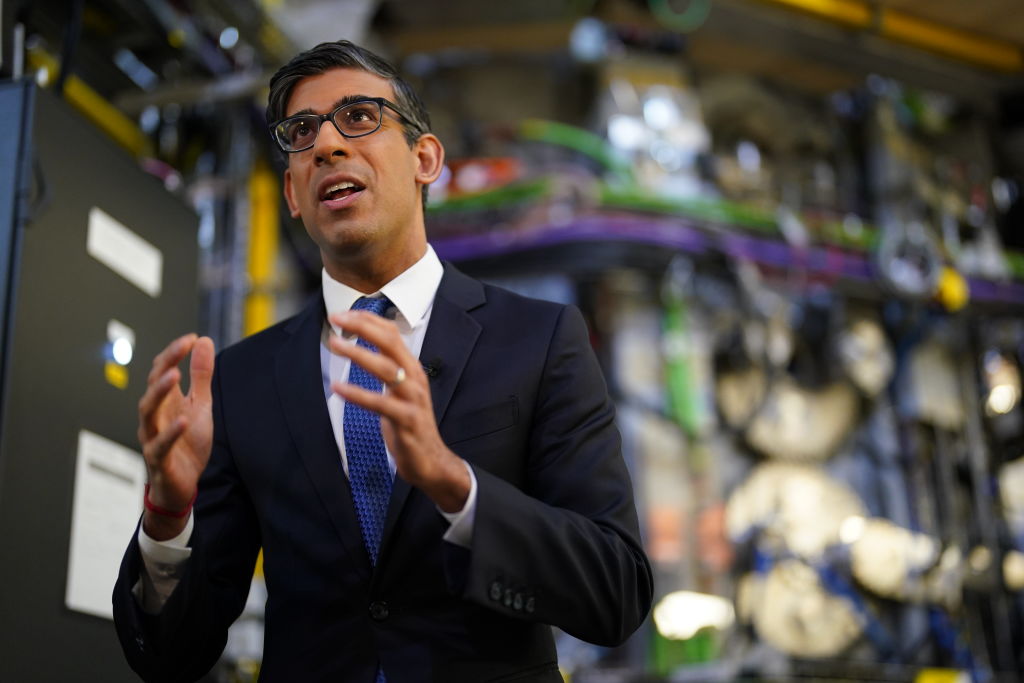Rishi Sunak has shown no indication that he is considering dumping the government’s legal commitment to achieve net zero by 2050. Nor, so far, has he indicated that he will relax any of the controversial targets for the next decade or so, such as banning new gas boilers or petrol and diesel cars. But his visit to Aberdeenshire today does mark a very sharp change in direction from the government’s green policy in Boris Johnson’s day. Sunak’s policy can be summed up in three words: Just Continue Oil.
For years, government policy has been predicated on the idea that oil and gas are declining, doomed industries and that therefore there is little point in investing or supporting them. Instead, the future lies in renewables. Now Sunak say he intends to issue hundreds of new oil and gas licences in the North Sea. Moreover, these are not just intended to satisfy immediate demand, to fill a hole while Britain transitions to a glorious green future. The most telling words from Sunak today are these: ‘Even when we’ve reached net zero in 2050, a quarter of our energy needs will come from oil and gas.’
Sunak’s policy can be summed up in three words: Just Continue Oil.
How could we achieve net zero while still using large quantities of fossil fuels? Sunak, along with energy secretary Grant Shapps, who made an announcement to this effect at The Spectator’s energy summit in April, has revived the government’s interest in Carbon Capture, Utilisation and Storage (CCUS). This involves extracting carbon dioxide from the exhaust streams of power stations, or even plain air, and turning it into either liquid or solid form so that it can be stored, hopefully, for ever after. The UK government has set aside £20 billion for investment in two CCUS plants: one in Humber and another in North East Scotland.
For many environmentalists this is sacrilege. They have convinced themselves that oil and gas are evil industries beyond all redemption, and they must simply be closed down. One senses Just Stop Oil protesters will be vibrating with rage this morning.
But it is not just eco-activists who have been left upset by Sunak’s announcement: Conservative MP and former energy minister Chris Skidmore has released a rather scathing statement on Twitter. ‘This is the wrong decision at precisely the wrong time, when the rest of the world is experiencing record heat waves,’ he wrote, continuing:
It is on the wrong side of a future economy that will be founded on renewable and clean industries and not fossil fuels. It is on the wrong side of modern voters who will vote with their feet at the next general election for parties that protect, and not threaten, our environment. And it is on the wrong side of history, that will not look favourably on the decision taken today. Worrying, this decision has also been announced when MPs are on recess, unable to hold the government to account. I will be writing to the Speaker to call for an emergency debate as soon as we return.
There are those who believe that Sunak is onto something, however: Myles Allen, Professor of Geosystem Science of Oxford University, is a noted advocate, believing CCUS to be an imperfect but inevitable part of the solution to eliminating net carbon emissions.
The government, though, has a bit of previous on CCUS. George Osborne set aside a more modest £1 billion for a demonstration plant, but the money was withdrawn in 2015 by which time only one project was still in the running. What has changed? CCUS is not an experimental technology — it has been used successfully in the oil and gas industries since the 1970s as a means of extracting carbon dioxide in order to pump it underground and so force more oil or gas out of declining wells. As of September last year, there were 196 (including two suspended) CCUS facilities around the world. But it has yet to be proven on a commercial scale when it comes to using the technology to remove large quantities of carbon dioxide from the air.
The problem is the cost, both financially and in terms of lost energy. There are also concerns about leakage, and how stable carbon dioxide reservoirs will prove. If the gas were to bubble up from the deep over time there would be no point in it, and it could even be dangerous (although there have been few concerns about storage facilities currently in use).
Yet critics who say CCUS is an ‘unproven’ technology have a habit of overlooking the fact that their own plans for net zero also involve multiple technologies which are unproven on a commercial scale. There is also the possibility of reducing the effective cost of CCUS by finding a use for the captured carbon dioxide – the ‘u’ in CCUS. It could, for example, potentially be used in solid for as a building materials.
The truth is that if we are to get anywhere near net zero, CCUS is likely going to have to play a very important part thanks to hard-to-decarbonise industries such as steel and cement. And if we have to develop CCUS for that, then there is surely a chance that gas and coal power – in conjunction with CCUS – will prove an economic alternative to renewables or nuclear as low-carbon sources of power. Not that this will wash with the likes of Just Stop Oil…







Comments